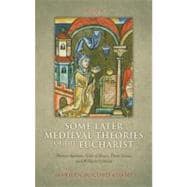
Note: Supplemental materials are not guaranteed with Rental or Used book purchases.
Purchase Benefits
What is included with this book?
| Introduction | p. 1 |
| Aristotelian Preliminaries | p. 4 |
| Why Sacraments? | |
| Sacraments: What, Why, and Wherefore | p. 31 |
| Sacramental Causality: ôEffecting What They Figure!ö | p. 51 |
| The Metaphysics and Physics of Real Presence | |
| How Does It Get Where? | |
| Explaining the Presence, Identifying the Change: Aquinas and Giles of Rome | p. 85 |
| Duns Scotus on Placement Problems | p. 111 |
| Duns Scotus on Two Types of Transubstantiation | p. 138 |
| Remodelling with Ockham | p. 152 |
| Independent Accidents? | |
| Accidents without Substance: Aquinas and Giles of Rome | p. 179 |
| Independent Accidents: Scotus and Ockham | p. 197 |
| Morals of the Story | |
| Theology Provoking Philosophy | p. 229 |
| What Sort of Union? | |
| Eucharistic Eating and Drinking | p. 259 |
| Sacraments, Why Ceasing? | p. 277 |
| List of Numbered Propositions | p. 297 |
| Bibliography | p. 303 |
| Index | p. 307 |
| Table of Contents provided by Ingram. All Rights Reserved. |
The New copy of this book will include any supplemental materials advertised. Please check the title of the book to determine if it should include any access cards, study guides, lab manuals, CDs, etc.
The Used, Rental and eBook copies of this book are not guaranteed to include any supplemental materials. Typically, only the book itself is included. This is true even if the title states it includes any access cards, study guides, lab manuals, CDs, etc.